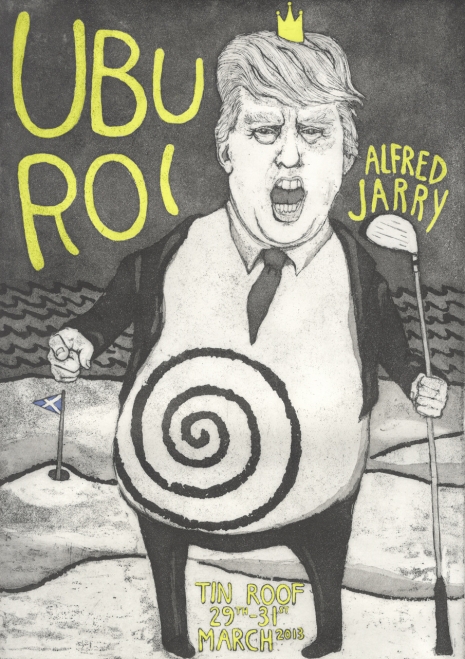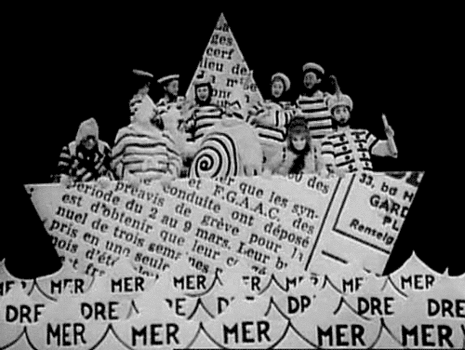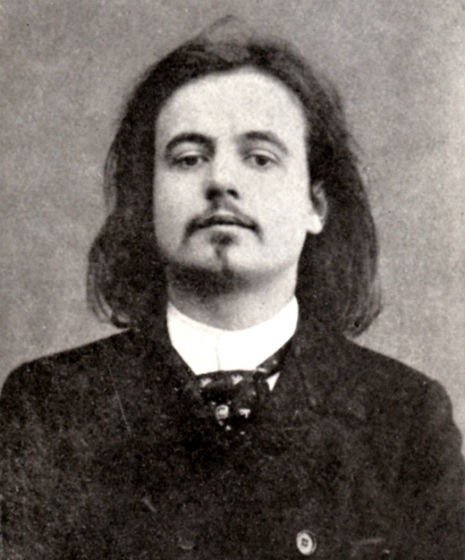
Poster for a re-interpreted version of Alfred Jarry’s ‘Ubu Roi’ from 2013 in which the tale of Donald Trump’s golf course development in Scotland follows the storyline of the play
French absurdist playwright Alfred Jarry’s Ubu Roi (“Ubu the King” or “King Turd”), a pre-Surrealist work, is considered an influential classic of French theatre. It originally premiered in 1896. There were three Ubu plays written by Jarry, but only one, Ubu Roi, was ever performed during his short lifetime. (Jarry died at the age of 34 of tuberculosis. After he beckoned a friend to come closer, his whispered last word on his deathbed was allegedly “toothpick” or whatever it is that the French call them.)
The Ubu trilogy was conceived to employ actors and marionettes in a vicious satire of greed, royalty, religion, stupidity and abuse of power by the wealthy. The two other plays were Ubu Cocu (“Ubu Cuckolded”) and Ubu Enchaîné (“Ubu in Chains”).
The protagonist “Père Ubu” (yes, this is obviously where the band’s name came from) was originally based on the teenage lampooning of a stuffy teacher written by two friends of Jarry’s from school, but Jarry expanded the plays and used the character as a vehicle for his howling critique of bourgeois society’s evils.
People absolutely hated the scandalous Ubu Roi—it was considered lewd, crude, vulgar and low—and its controversial author. At the premiere in Paris, it was booed for a good fifteen minutes after the first word, “Merdre!” (his coinage for “shit,” deliberately close to the French merde and translated in English as “Pshit” or “Shittr!”), was spoken. Fist fights broke out in the orchestra pit. Jarry’s supporters yelled “You wouldn’t understand Shakespeare, either!” His detractors rejoined with their variations on the theme of “shit.”
William Butler Yeats was apparently in the audience that night in 1896 and is alleged to have said “What more is possible? After us, the Savage God.”
Or an idiot racist billionaire babyman put in charge of the nuclear codes who thinks people should drink bleach?
The play was accused of being politically subversive, the work of an anarchist mindfucker or even that it was a “hoax” designed to hoodwink a gullible middle-class audience with metaphorical shit that some of them, at least, would say tasted good.
This seems so freaking familiar, doesn’t it?
Not that an absurdist agitator like Alfred Jarry cared about any of this. Characters had names like “MacNure,” “Pissweet” and “Pissale.” Confrontationally pissing off the audience was practically the entire point for him. Ubu’s scepter, after all, was a shit-smeared toilet brush.

A ship of fools in a sea of shit…
Via Wikipedia:
According to Jane Taylor, “The central character is notorious for his infantile engagement with his world. Ubu inhabits a domain of greedy self-gratification.” Jarry’s metaphor for the modern man, he is an antihero—fat, ugly, vulgar, gluttonous, grandiose, dishonest, stupid, jejune, voracious, cruel, cowardly and evil—who grew out of schoolboy legends about the imaginary life of a hated teacher who had been at one point a slave on a Turkish Galley, at another frozen in ice in Norway and at one more the King of Poland. Ubu Roi follows and explores his political, martial and felonious exploits, offering parodic adaptations of situations and plot-lines from Shakespearean drama, including Macbeth, Hamlet and Richard III: like Macbeth, Ubu—on the urging of his wife—murders the king who helped him and usurps his throne, and is in turn defeated and killed by his son; Jarry also adapts the ghost of the dead king and Fortinbras’s revolt from Hamlet, Buckingham’s refusal of reward for assisting a usurpation from Richard III and The Winter’s Tale‘s bear.
“There is,” wrote Taylor, “a particular kind of pleasure for an audience watching these infantile attacks. Part of the satisfaction arises from the fact that in the burlesque mode which Jarry invents, there is no place for consequence. While Ubu may be relentless in his political aspirations, and brutal in his personal relations, he apparently has no measurable effect upon those who inhabit the farcical world which he creates around himself. He thus acts out our most childish rages and desires, in which we seek to gratify ourselves at all cost.” The derived adjective “ubuesque” is recurrent in French and francophone political debate.
Sound like anyone you know?
All that’s missing is his shit-smeared toilet brush, if you ask me.

After achieving fame, or rather infamy, for his scatological play, the 23-year-old Jarry obnoxiously began to model his patterns of speech after the actor who played Père Ubu. Interestingly, that actor had modeled his portrayal of Ubu on Alfred Jarry’s already strange speaking style of drawing out each syllable in a nasally staccato. He also began to walk like Ubu!
Like his fictional idiot king, Jarry used the royal “we,” and called the wind “that which blows.” His bicycle was “that which rolls.” You get the picture. Jarry was a big druggie, known to be an enthusiastic ether inhaler and absinthe imbiber. Eventually he could scarcely tell himself from his fictional characters and died in a hospital for the impoverished. After his death, he became a figure of great fascination for Picasso, who purchased Jarry’s revolver and carried it with him whenever he was out at night.
Joan Miró used the image of Ubu Roi to satirize General Franco in 50 lithographs after the military won the Spanish Civil War. In 1978, once Franco was dead, Miró staged a play, Mori el Merma, with the Teatre de la Claca group. In this play Ubu (here called “Merma”) is a thinly-veiled metaphor for Franco, a vicious, bloodthirsty tyrant.

Paul McCartney was reading Ubu Roi while he was writing the lyrics for “Maxwell’s Silver Hammer” on Abbey Road. (“Joan was quizzical; studied pataphysical science in the home” presumably refers both to Miró, who’d illustrated a famous 1966 publication of the play and Jarry himself, father of the hallucinatory anti-philosophy of pataphysics). The Ubu Productions dog seen at the end of every episode of Family Ties (“Sit, Ubu, sit… good dog”) was named after Jarry’s play as well and no doubt is the way that most people have heard the name of his oafish tyrant, even more than the musical group.
Here is Alfred Jarry’s Ubu Roi as it was produced for French television in 1966 by Jean-Christophe Averty. This piece—which utilizes the Kinoscope process of filming off a video screen—is absolutely stunning, a real achievement considering the technology of the era. Averty, who also directed the 30-minute short “Melody” aka “Histoire de Melody Nelson” starring Serge Gainsbourg and Jane Birkin, had had a long and distinguished career in French TV, film and radio. He died in 2017.